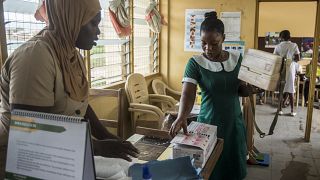Malaria
New data from the WHO has revealed that the COVID-19 pandemic has disrupted malaria services, leading to an increase in cases and deaths.
According to the report, there were an estimated 241 million malaria cases and 627,000 malaria deaths worldwide in 2020, represents about 14 million more cases in 2020 compared to 2019 and 69,000 more deaths.
Approximately two-thirds of these additional deaths (47,000) werelinked to disruptions in the provision of malaria prevention, diagnosis and treatment during the pandemic.
Director for Global Malaria Programme, World Health Organization, Dr Pedro Alonso explained; In this year's World Malaria Report, we recognize that neither in terms of reduction of deaths or reduction of cases are we making any further progress. We have stalled. ....... I think we are on the verge of a potential malaria crisis. Not only are we getting closer to elimination or eradication globally, but also the problem becoming worse in a substantial number of parts of Africa. This calls for a renewed sense of purpose of action, of addressing what is far from being an unfinished agenda. It is still a massive global health problem that needs to betackled with decisiveness and having countries, the endemic countries themselves leading the- charge...
Since 2015, the baseline date for WHO’s global malaria strategy, 24 countries have registered increases in malaria deaths. In the 11 countries that carry the highest burden of malaria worldwide, cases increased from 150 million in 2015 to 163 million cases in 2020, and malaria deaths increased from 390,000 to 444,600 over that same period.
As part of interventions to reduce the infection rate, the WHO earlier this year recommended a first-generation malaria vaccine, to be deployed broadly to children living in areas of moderate to high transmission.
:".... The significance of these two announcements, first, the WHO recommendation, secondly, the Gavi endorsement is, I believe, truly historical. We need new tools. With the tools we have right now we can save lives and we have saved lives, but we cannot imagine that we will go on making the type of progress that is needed. We need also technological tools. We need new vaccines. We need new medicines. And the fact that for the first time, a malaria vaccine can join the other tools that we have to more effectively fight malaria to reduce what we estimate, an extra 40 to 8,0000 deaths of African children every year is a scientific and public health breakthrough. Dr Pedro Alonso said
Sub-Saharan Africa continues to carry the heaviest malaria burden, accounting for about 95% of all malaria cases and 96 percent of all deaths in 2020.













Go to video
Almost 300 killed in wave of violence in Sudan’s North Kordofan
01:11
World leaders express condolences over death of Nigerian ex-president Muhammadu Buhari
02:02
Could AI help fight mosquito-borne diseases?
Go to video
First Malaria treatment for babies approved
Go to video
Families grapple with life in the wake of the Israel-Iran Conflict
11:15
AI drones lead breakthrough against malaria in Africa [Business Africa]